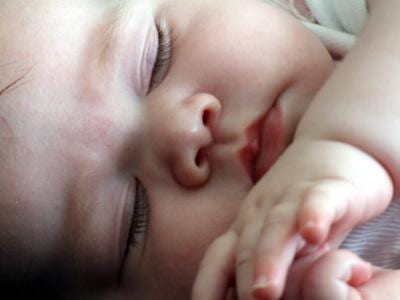Sleep is a basic human need and is required for proper growth and development. While the amount of sleep a baby requires can vary, depending on the age of the baby and, to some extent, the baby’s individual sleep needs, there are typical amounts of sleep that babies require for optimal health.
Sleep Requirements
Full-term newborns require approximately 16 hours of sleep per 24-hour period. The older a baby gets, the less sleep he will require. By 3 months of age, babies need about 13 hours of sleep per 24-hour period. Eight and one-half hours of this sleep should be nighttime sleep. By 6 months of age, babies need about 12.5 hours of sleep per 24-hour period, 9 1/4 hours of which should be nighttime sleep. By 1 year of age, most babies need 11.75 hours of sleep per 24-hour period. Nine and three-fourths hours of this sleep should occur at nighttime.
Importance of Sleep
In addition to being cranky, irritated and difficult to soothe, when babies don’t get enough sleep, it can affect their development. Babies grow, and their bodies and brains mature during their sleep time. During deep sleep, the growth hormone that is responsible for physical development is secreted. If a baby continuously does not get adequate sleep, it can lead to insufficient secretions of the growth hormone which can compromise growth and development.
Good Sleep Habits
Establishing good sleep habits can increase the chances that your baby gets adequate sleep. By 3 months of age, babies should be on consistent eating and sleeping schedules. Consistent sleep scheduling will help your baby develop her internal clock that will alert her as to when it’s time to fall asleep and wake up. Babies should be put to sleep with as minimal assistance as possible so they can develop self-soothing skills. When babies learn to fall asleep on their own, they are better able to fall back to sleep on their own, if they wake up in the middle of the night.
Extending Sleep
Babies who are swaddled tend to sleep longer than babies who are not. This is because the snug wrap of the swaddle prevents the baby’s startle reflex from waking him up. The startle reflex is a baby’s response to loud noises; it includes opening up his arms and legs widely. Between 3 to 6 months of age, this reflex usually disappears. Using a sound machine that plays white noise can also extend sleep. In addition to playing consistent soothing sounds, the white noise the sound machine makes will drown other sounds out.
The Myth About Napping
Napping can affect nighttime sleep, but not in the way most parents believe it to. Many parents don’t want their baby to nap because they are afraid that if she naps during the day, especially in the late afternoon, she won’t sleep well at night. This is untrue. The truth is that tired babies become overtired babies very quickly. When bedtime comes and a tired baby hasn’t napped, she can be incredibility difficult to calm down and can have a difficult time falling and staying asleep.





